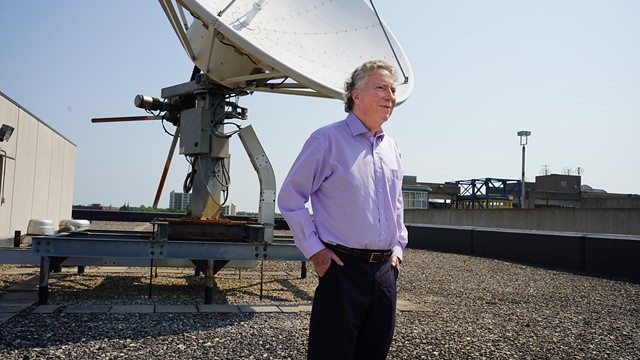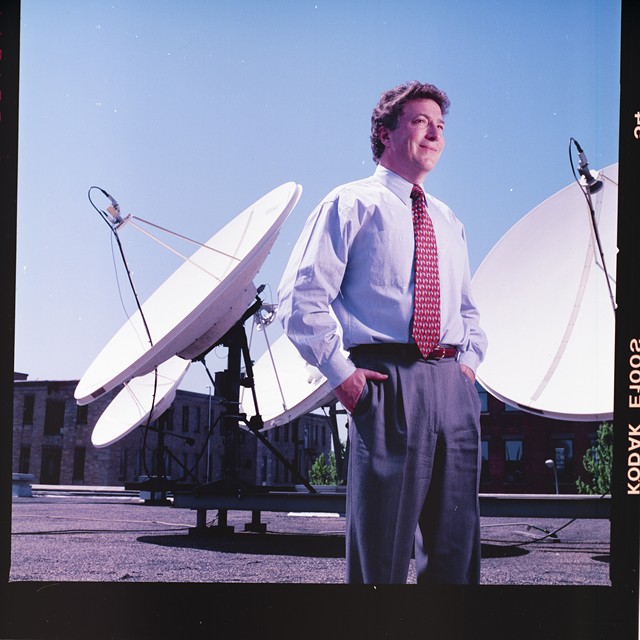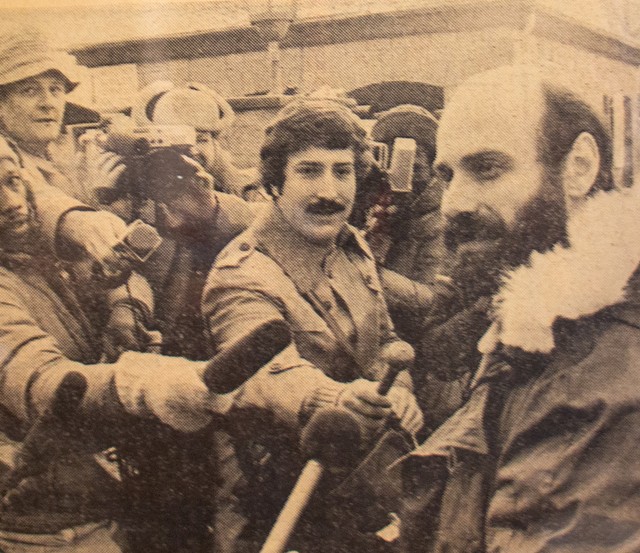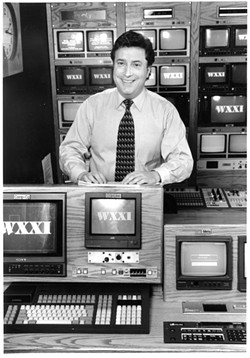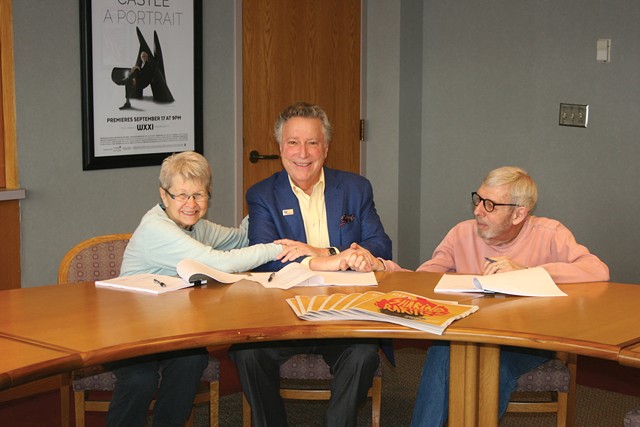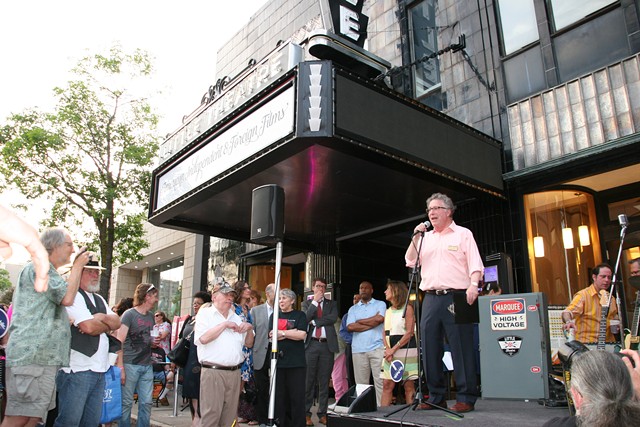[
{
"name": "500x250 Ad",
"insertPoint": "5",
"component": "15667920",
"parentWrapperClass": "",
"requiredCountToDisplay": "1"
}
]
When Norm Silverstein arrived in Rochester to helm WXXI Public Broadcasting in 1995, he was in his early 40s and expected to be in the role — like others he’d held before it — for perhaps four or five years. He’d never been to Rochester before, and a Washington, DC colleague warned him not to make any jokes about the weather.
“I made the joke once, and that was it,” Silverstein said, “because everybody immediately stopped and looked very stoic.”
He’s well accustomed to that weather (and those well-intended, if poorly landing jokes) now — this month, Silverstein will retire from WXXI after 28 years as CEO and just as many years as a Rochesterian.
What follows is Silverstein in his own words, as told to CITY editor Leah Stacy. From his native New Jersey and reporting from Germany to his public relations tenure at the Maryland State House and, of course, a new journey in Rochester with his wife, Jane, and their two young boys.
CITY: I want to start at the beginning. Rochester is home now, and has been for almost 30 years. But where did you grow up?
NS: I grew up in Jersey City, but I didn't stay there. I went to American University, and after that, I was in the Washington, DC area and that’s when I met Jane. We were both working in journalism. I was a reporter for WTOP-AM in Washington, which was the CBS news station, and Jane was working for a small station in Annapolis, so we’d both be in the press room at the Maryland State House.
CITY: Were you a journalism major at American? Was that always the goal?
NS: Interesting story. I wasn't sure what I wanted to do when I was in college — I thought maybe I’d be a lawyer, but I didn't like what was going on with Watergate. I liked writing, and I had a creative writing professor by the name of Larry McMurtry, who wrote “The Last Picture Show,” oh, and “Terms of Endearment.” When I finished the class, he said, “Your creative writing is OK, but your nonfiction writing is really good. You ought to go talk to the head of the communications department.” So that one little class with Larry McMurtry got me started.
CITY: So a communication degree, then?
NS: I graduated with a political science degree and the equivalent of a second degree in communication. I got lucky again, because the head of the comm department at the time was Ed Bliss Jr., who had been a writer for Edward R. Murrow as well as worked with Walter Cronkite and a lot of other people who formed broadcast journalism as we know it today. And then the class assistant was Bob Edwards (who would later become longtime host of NPR's “Morning Edition.”) One of my classmates, Susan Zirinsky, ended up being the first woman to head CBS News.
CITY: Wow. This is so much ‘right time, right place.’
NS: Yeah, a lot of all-stars. So I was still in school when I sent a resume to the news director at WTOP-FM in Washington — not knowing anything about how you do this. I called him up, and he said, “Yeah, I need somebody right now. Are you available?” I jumped in the car and drove to Washington. Had a flat tire on the way, and had to change it. But when I got there, I started working as a production assistant.
CITY: That’s some gumption. Instead of an internship, you just started working while you were still a student?
NS: It was only part-time, but I was able to start learning everything. I always thought being a reporter was the best time. I worked at a few other news stations in Washington getting experience after college, and then I went back to WTOP working as a writer and an editor, but they wouldn’t make me a reporter. As I was finishing up one day — living in Baltimore and working in Washington — they said, “There's been a big train crash in Prince George’s County, why don't you swing by and help out Dave.” So I got out there, and there was a huge derailment of Amtrak's Montrealer passenger train, like 125 people were hurt. And I ended up covering the story because Dave never found the rural area. I fed CBS all night, because I knocked on the door of a nearby house and asked if I could use their phone. And that’s how I became a reporter.
CITY: And you were what, in your early 20s at the time?
NS: Probably 22, 23. Then the 444-day Iranian hostage crisis was going on, and I was assigned to cover the families because so many of them were from Washington. The station always said that if the hostages were being freed, they were going to send me over to cover it. And that's what happened. I was dating Jane at the time, and we were supposed to spend the day together, but I got a call at like 7 a.m., “We hear the hostages may be released, so pack a bag because we might send you over to Germany tonight.” Sure enough, I got a call. I'd never had an overseas assignment. Next thing I know, it's like 5 p.m. and I’m at Dulles Airport on my way to Frankfurt.
CITY: And Jane understood because she was also in the news?
NS: She thought it was pretty exciting. We obviously weren’t taking the day off after that call. Then I was there for two straight weeks, right? They expected me to report every time the shift changed, so I never got more than a few hours sleep at night because they were always calling me up and there was the time difference. You need to be young to be able to do that.
CITY: Definitely need resilience. And maybe a bit of the journalism bug. Does anyone else in your family work in the media?
NS: My father had a small business, and my mother actually worked for a little newspaper in Jersey City as an office manager. When I was about 15, they hired me as a proofreader. So that was my little taste.
CITY: Aside from journalism, you also had a brief bout as a press secretary, right?
NS: After two weeks covering the hostage situation, I had hoped to get the Capitol Hill assignment, but I didn't get it. So I decided maybe it was time to make a move, and then I got a call from the governor's office in Maryland and they wanted to talk to me about being one of the press secretaries. Now, I was a very tough reporter when I was covering the State House, because they always made the broadcast journalists take second seat to the print journalists. That's what it was like back then. I thought that wasn't really fair — I was covering this for the major station in Washington, and yet I had to wait ‘til everybody from the print side was able to do their interviews. So I decided I was going to shake it up. I knocked on the door, and the troopers knew me, so they let me in. I walked through the outside office, and the trooper opens the door to the inner office where the print reporters are, and the press secretary yells, “Get him out of here!” And they actually took me by the shoulder and said, “We'll let you know when you can come in.” I was really ticked, so I called my news director up and then he called the Associated Press, and the AP did a story about it. The governor's office came out and said, “We're not going to do that anymore. Everybody gets to go in at the same time.” The story about me getting kicked out of the governor's office was printed in newspapers up and down the East Coast.
CITY: And then they called to offer you a job.
NS: Right, and I was shocked, because I was never giving the governor a break. I didn't think I was going to do the job for more than a couple of years. Story of my life. I was deputy press secretary for about four or five years, and when the administration was coming to an end, the governor's chief of staff said, “There's a new president at Maryland Public TV, and they could really use somebody like you. Do you want me to write a letter to them?” And I said, “No, that's OK. I have other opportunities.” Well, he wrote a letter. Next thing I know, I'm getting a phone call, and it's the first of three two-hour interviews to be the news director at Maryland Public TV. I got hired. And then I got a call from the board chair, who was the vice chair of Johns Hopkins University. And he said, “You know, we really had a lot of trouble with our relationship with Annapolis — the state capital — and we could really use your help before you start this other position.” So I called Jane up and said, “do you think I should just tell them no? I really want to be a news director. I don't want to wait.” And she said, “Do it. You can always get another news job. Try it for six months.”
CITY: Good advice.
NS: Yeah. Always good advice from Jane. So I'm there for a certain amount of time, and the head of administration, the number two position at Maryland Public Television, announces she's retiring. And the president says, “I want you to apply for that job.” And I said, “I want to be head of news and public affairs. I've got some great ideas.” He said, “No, I want you to apply for this job.” And I said, “But everybody hates that person. That's the person who turns down raises.” And he goes, “You're not listening. I want you to apply for that job.” And I said, “OK, I'll apply for that job, but if I get it, I want the station to help pay for my master's degree, because I really needed more background to do that kind of work.” And he said, “OK.”
CITY: Incredible. So you get an MBA and eventually get recruited here with a young family, right?
NS: Right, part of why we moved was because the schools were better here. Ben was seven, and Lee was four. They became captains of the Pittsford swim team, and they’re in their 30s now, so they’ve pretty much grown up here. And they’ve never let anything go to my head. I’d file a report and it would air later, so we might be driving someplace, and then hear: “Norm Silverstein reports from such and such.” And they would always roll their eyes and laugh.
CITY: Was there anyone who took you under their wing and showed you the city or introduced you to people in the community?
NS: I was only like 40-something years old. I didn’t really know my way around. But I was lucky that one of my early board chairs was Harry Trueheart of Nixon Peabody, and he kind of took me under his wing. I remember there was an opportunity to go to a weeklong course at Harvard, for CEOs and board chairs, but not for public television, and I said to him, “Would you go to Harvard with me for this course?” And Trueheart actually was a Harvard grad but he said yes. There are still times I go back to what I learned in that class.
CITY: Outside work, what are some of the things about Rochester that you made your own?
NS: People in Rochester don't appreciate what they have. We immediately discovered Finger Lakes wine country. Jane loves to golf, and she always says how great the courses are here. The medical community was starting to really come into its own. And that was something we felt deserved more coverage, and one of the things that helped inspire us to launch “Second Opinion” with the University of Rochester Medical Center.
CITY: What do you want the next generation of public media to know?
NS: Remember that we started as educational broadcasting, and we still make a huge difference, particularly in kids’ lives. This station has always had a reputation for understanding that public media should always start with education. That's why I recruited Susan Rogers from Rochester Institute of Technology to be the COO and eventually, general manager. An attorney friend in Washington told me to look her up when I moved here, and I remember writing it down. A year after I started, I saw her present at RIT at 7 a.m. on her birthday, and while they served cake after I went right up to her and said, “Would you like to have lunch?” I hired her immediately. That was 27 years ago.
CITY: What do you hope happens in the next 28 years of WXXI?
NS: I hope XXI continues to grow and be an example for what public media should be; that things we started continue and only get better. People really look up to the station, and I'm really proud that when I go places, people know what WXXI is. And they’ll ask, “How is it so successful?” And I say, “We try things here.”
Leah Stacy is the editor-in-chief of CITY.
“I made the joke once, and that was it,” Silverstein said, “because everybody immediately stopped and looked very stoic.”
He’s well accustomed to that weather (and those well-intended, if poorly landing jokes) now — this month, Silverstein will retire from WXXI after 28 years as CEO and just as many years as a Rochesterian.
What follows is Silverstein in his own words, as told to CITY editor Leah Stacy. From his native New Jersey and reporting from Germany to his public relations tenure at the Maryland State House and, of course, a new journey in Rochester with his wife, Jane, and their two young boys.
_________________________________
CITY: I want to start at the beginning. Rochester is home now, and has been for almost 30 years. But where did you grow up?
NS: I grew up in Jersey City, but I didn't stay there. I went to American University, and after that, I was in the Washington, DC area and that’s when I met Jane. We were both working in journalism. I was a reporter for WTOP-AM in Washington, which was the CBS news station, and Jane was working for a small station in Annapolis, so we’d both be in the press room at the Maryland State House.
CITY: Were you a journalism major at American? Was that always the goal?
NS: Interesting story. I wasn't sure what I wanted to do when I was in college — I thought maybe I’d be a lawyer, but I didn't like what was going on with Watergate. I liked writing, and I had a creative writing professor by the name of Larry McMurtry, who wrote “The Last Picture Show,” oh, and “Terms of Endearment.” When I finished the class, he said, “Your creative writing is OK, but your nonfiction writing is really good. You ought to go talk to the head of the communications department.” So that one little class with Larry McMurtry got me started.
CITY: So a communication degree, then?
NS: I graduated with a political science degree and the equivalent of a second degree in communication. I got lucky again, because the head of the comm department at the time was Ed Bliss Jr., who had been a writer for Edward R. Murrow as well as worked with Walter Cronkite and a lot of other people who formed broadcast journalism as we know it today. And then the class assistant was Bob Edwards (who would later become longtime host of NPR's “Morning Edition.”) One of my classmates, Susan Zirinsky, ended up being the first woman to head CBS News.
CITY: Wow. This is so much ‘right time, right place.’
NS: Yeah, a lot of all-stars. So I was still in school when I sent a resume to the news director at WTOP-FM in Washington — not knowing anything about how you do this. I called him up, and he said, “Yeah, I need somebody right now. Are you available?” I jumped in the car and drove to Washington. Had a flat tire on the way, and had to change it. But when I got there, I started working as a production assistant.
CITY: That’s some gumption. Instead of an internship, you just started working while you were still a student?
NS: It was only part-time, but I was able to start learning everything. I always thought being a reporter was the best time. I worked at a few other news stations in Washington getting experience after college, and then I went back to WTOP working as a writer and an editor, but they wouldn’t make me a reporter. As I was finishing up one day — living in Baltimore and working in Washington — they said, “There's been a big train crash in Prince George’s County, why don't you swing by and help out Dave.” So I got out there, and there was a huge derailment of Amtrak's Montrealer passenger train, like 125 people were hurt. And I ended up covering the story because Dave never found the rural area. I fed CBS all night, because I knocked on the door of a nearby house and asked if I could use their phone. And that’s how I became a reporter.
CITY: And you were what, in your early 20s at the time?
NS: Probably 22, 23. Then the 444-day Iranian hostage crisis was going on, and I was assigned to cover the families because so many of them were from Washington. The station always said that if the hostages were being freed, they were going to send me over to cover it. And that's what happened. I was dating Jane at the time, and we were supposed to spend the day together, but I got a call at like 7 a.m., “We hear the hostages may be released, so pack a bag because we might send you over to Germany tonight.” Sure enough, I got a call. I'd never had an overseas assignment. Next thing I know, it's like 5 p.m. and I’m at Dulles Airport on my way to Frankfurt.
CITY: And Jane understood because she was also in the news?
NS: She thought it was pretty exciting. We obviously weren’t taking the day off after that call. Then I was there for two straight weeks, right? They expected me to report every time the shift changed, so I never got more than a few hours sleep at night because they were always calling me up and there was the time difference. You need to be young to be able to do that.
CITY: Definitely need resilience. And maybe a bit of the journalism bug. Does anyone else in your family work in the media?
NS: My father had a small business, and my mother actually worked for a little newspaper in Jersey City as an office manager. When I was about 15, they hired me as a proofreader. So that was my little taste.
CITY: Aside from journalism, you also had a brief bout as a press secretary, right?
NS: After two weeks covering the hostage situation, I had hoped to get the Capitol Hill assignment, but I didn't get it. So I decided maybe it was time to make a move, and then I got a call from the governor's office in Maryland and they wanted to talk to me about being one of the press secretaries. Now, I was a very tough reporter when I was covering the State House, because they always made the broadcast journalists take second seat to the print journalists. That's what it was like back then. I thought that wasn't really fair — I was covering this for the major station in Washington, and yet I had to wait ‘til everybody from the print side was able to do their interviews. So I decided I was going to shake it up. I knocked on the door, and the troopers knew me, so they let me in. I walked through the outside office, and the trooper opens the door to the inner office where the print reporters are, and the press secretary yells, “Get him out of here!” And they actually took me by the shoulder and said, “We'll let you know when you can come in.” I was really ticked, so I called my news director up and then he called the Associated Press, and the AP did a story about it. The governor's office came out and said, “We're not going to do that anymore. Everybody gets to go in at the same time.” The story about me getting kicked out of the governor's office was printed in newspapers up and down the East Coast.
CITY: And then they called to offer you a job.
NS: Right, and I was shocked, because I was never giving the governor a break. I didn't think I was going to do the job for more than a couple of years. Story of my life. I was deputy press secretary for about four or five years, and when the administration was coming to an end, the governor's chief of staff said, “There's a new president at Maryland Public TV, and they could really use somebody like you. Do you want me to write a letter to them?” And I said, “No, that's OK. I have other opportunities.” Well, he wrote a letter. Next thing I know, I'm getting a phone call, and it's the first of three two-hour interviews to be the news director at Maryland Public TV. I got hired. And then I got a call from the board chair, who was the vice chair of Johns Hopkins University. And he said, “You know, we really had a lot of trouble with our relationship with Annapolis — the state capital — and we could really use your help before you start this other position.” So I called Jane up and said, “do you think I should just tell them no? I really want to be a news director. I don't want to wait.” And she said, “Do it. You can always get another news job. Try it for six months.”
CITY: Good advice.
NS: Yeah. Always good advice from Jane. So I'm there for a certain amount of time, and the head of administration, the number two position at Maryland Public Television, announces she's retiring. And the president says, “I want you to apply for that job.” And I said, “I want to be head of news and public affairs. I've got some great ideas.” He said, “No, I want you to apply for this job.” And I said, “But everybody hates that person. That's the person who turns down raises.” And he goes, “You're not listening. I want you to apply for that job.” And I said, “OK, I'll apply for that job, but if I get it, I want the station to help pay for my master's degree, because I really needed more background to do that kind of work.” And he said, “OK.”
CITY: Incredible. So you get an MBA and eventually get recruited here with a young family, right?
NS: Right, part of why we moved was because the schools were better here. Ben was seven, and Lee was four. They became captains of the Pittsford swim team, and they’re in their 30s now, so they’ve pretty much grown up here. And they’ve never let anything go to my head. I’d file a report and it would air later, so we might be driving someplace, and then hear: “Norm Silverstein reports from such and such.” And they would always roll their eyes and laugh.
CITY: Was there anyone who took you under their wing and showed you the city or introduced you to people in the community?
NS: I was only like 40-something years old. I didn’t really know my way around. But I was lucky that one of my early board chairs was Harry Trueheart of Nixon Peabody, and he kind of took me under his wing. I remember there was an opportunity to go to a weeklong course at Harvard, for CEOs and board chairs, but not for public television, and I said to him, “Would you go to Harvard with me for this course?” And Trueheart actually was a Harvard grad but he said yes. There are still times I go back to what I learned in that class.
CITY: Outside work, what are some of the things about Rochester that you made your own?
NS: People in Rochester don't appreciate what they have. We immediately discovered Finger Lakes wine country. Jane loves to golf, and she always says how great the courses are here. The medical community was starting to really come into its own. And that was something we felt deserved more coverage, and one of the things that helped inspire us to launch “Second Opinion” with the University of Rochester Medical Center.
CITY: What do you want the next generation of public media to know?
NS: Remember that we started as educational broadcasting, and we still make a huge difference, particularly in kids’ lives. This station has always had a reputation for understanding that public media should always start with education. That's why I recruited Susan Rogers from Rochester Institute of Technology to be the COO and eventually, general manager. An attorney friend in Washington told me to look her up when I moved here, and I remember writing it down. A year after I started, I saw her present at RIT at 7 a.m. on her birthday, and while they served cake after I went right up to her and said, “Would you like to have lunch?” I hired her immediately. That was 27 years ago.
CITY: What do you hope happens in the next 28 years of WXXI?
NS: I hope XXI continues to grow and be an example for what public media should be; that things we started continue and only get better. People really look up to the station, and I'm really proud that when I go places, people know what WXXI is. And they’ll ask, “How is it so successful?” And I say, “We try things here.”
Leah Stacy is the editor-in-chief of CITY.
More by Leah Stacy
-

Glory days
Sep 13, 2024 -

Acme Bar & Pizza closes after 26 years
Aug 29, 2024 -

Pete Davidson cancels headlining Rochester Fringe Festival performance
Aug 1, 2024 - More »
